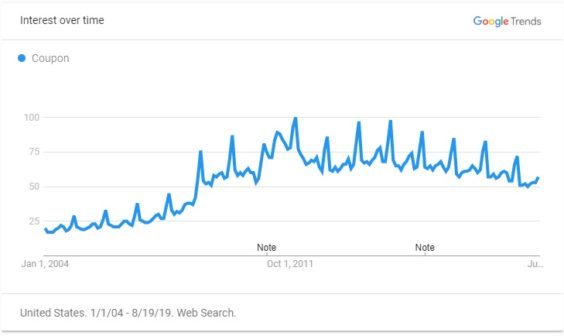The state of the economy is a pretty good predictor of the popularity of coupons. When the economy is bad, interest in coupons perks up. When the economy is good, coupon use declines. But can this predictor work the other way around? That is to say, if coupon use is on the rise, does that mean there are tough economic times ahead?
That’s a little like saying when it rains, umbrellas become more popular – and when umbrellas are popular, it must mean it’s going to rain. The cause-and-effect doesn’t really work both ways.
Nevertheless, a data research company is pointing to the continued decline in coupon use to reassure us in these anxious times that the economy is going to be just fine.
In a unique approach to checking the country’s economic health, DataTrek examined Google Trends, which shows the popularity of various search terms over time. DataTrek decided to look at how often we’re Googling for specific words, like “coupon”.
“Our rationale for thinking this is a leading indicator is that U.S. consumers will start looking for product/service discounts as economic uncertainty increases,” DataTrek explained.
What they found was that searches for the word “coupon” have steadily decreased since 2012. Starting in 2004, when Google Trends began collecting data, the number of Google searches for “coupon” increased each year leading up to the Great Recession that began in late 2007. That’s when internet searches for coupons took off, peaking in 2011 before declining each year since:
The peaks and valleys of the month-by-month line chart are particularly interesting. They show small increases in coupon interest each year in late summer during back-to-school shopping season, and large peaks each December for holiday gift shopping season. But eventually the chart settles down again, with the overall trend continuing to head downward.
DataTrek also took a look at some other search terms, like “unemployment” and “TV”, both of which are flat or declining in popularity. People search for information about unemployment “when they fear a layoff is imminent, allowing Google Trends to act as a useful leading indicator,” DataTrek explained, as opposed to actual unemployment data, which “only capture employment trends after layoffs start.”
And what does “TV” have to do with the health of the economy? When there’s less work available, “workers have more time to consume media,” DataTrek reasoned. So, using that rationale, fewer searches for “TV” indicates that people are too busy working and making money to search for TV shows to watch.
“Taken as a whole, these three indicators give us little cause for concern just now,” DataTrek concluded.
Actual statistics about the rate of coupon use have shown that coupons have been declining in popularity in recent years. So it’s not just Google searches for the word “coupon” that are following a downward trend.
But with a trade war intensifying, global growth cooling and the stock market suffering whiplash lately, do Google searches really prove anything about the health of the U.S. economy?
“If the Federal Reserve looked at Google Trends, they might not be so inclined to cut rates,” DataTrek boldly declared.
So according to DataTrek, you can rest easy the next time Wall Street takes a dive or new tariffs take effect. But you might not want to quit searching for, clipping and using coupons – just in case.















